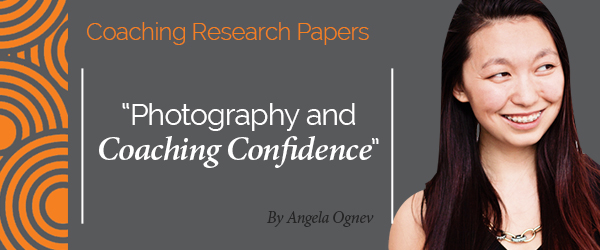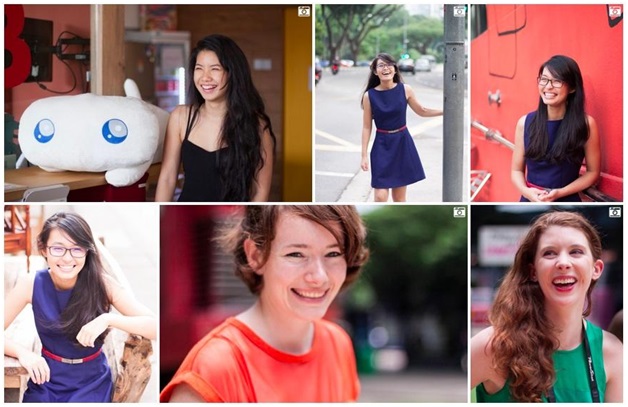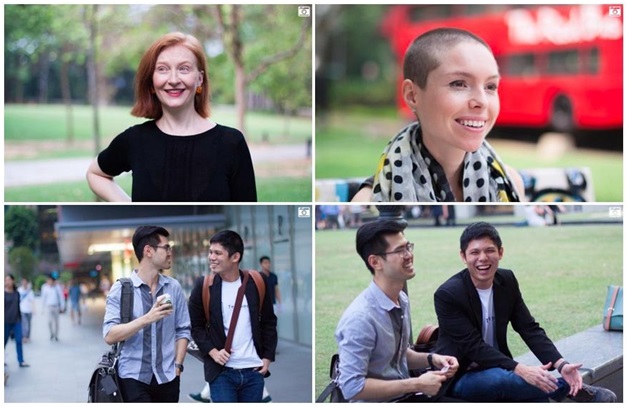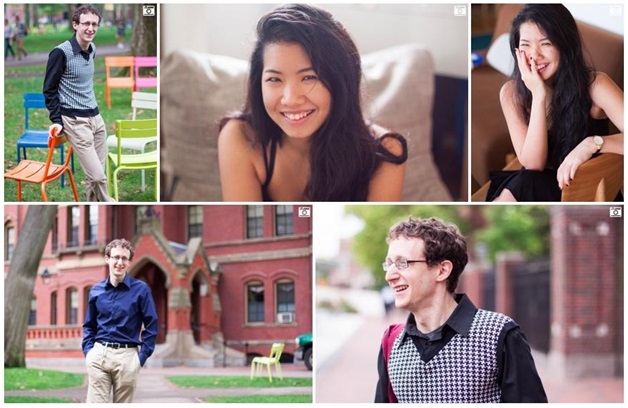
Research Paper By Angela Ognev
(Transformational Coach, SINGAPORE)
Photography lends itself to coaching confidence: it is powerful to see myself in a picture exactly as I imagined. In a photo, I see the brilliance of who I am and who I want to be. I feel authentic, whole, and realised. I know that when I share this image, I represent the unabashed me, that I was — for once — not misrepresented.
Introduction
A brief aside: The Humans of New York photography project inspires me — I choose to learn about the lives, desires, pains of New York citizens rather than read the national news. It fills my head with possibility, passion, and the bittersweetness of letting go. Eyes opened by the authenticity and life story behind each single paragraph, I started my own project: Happiness Is Beautiful.
HappinessIsBeautiful.com began as a way of catching up with acquantances in an intimate, natural setting, while providing both emotional and tangible value — we’d have conversation alongside a photoshoot. These sessions energised me. In an hour, people who branded themselves as camera-shy out of self-consciousness, practicality, or personality became fully relaxed, and the camera captured their natural energy. I realised that certain coaching questions came naturally here, on celebrating the past and acknowledging the little moments of the present. These coaching questions create a unique space of vulnerability, happiness, and trust — we feel as if the camera was invisible.
 In Theory
In Theory
Confidence = Self-awareness + Self-belief + Self-love
This is a powerful equation from International Coach Academy’s series of papers on Life Design (2012). Why? Because it takes a trait we so value, breaks it into manageable chunks, and lets us know that it is we — not others — that get to give it meaning.
Self-awareness
This is a good place to start because it moves from unconsciousness to consciousness. This is the beginning of the questions “who am I?” From when we are young, we are filled with messages about the self — though not about self-awareness. We’re asked to fill certain roles, to be certain ways, to live up to certain standards. We’re asked to identify strengths and weaknesses in interview settings, resulting in strategies and tips to being authentic (or rather, for getting the job). We seek to be accepted by our fellow preschoolers, who, even at the young age, group into the “fits” and “misfits.” We are constantly compared and we constantly compare ourselves, as if there is no value within us — there is only value in the differences between two people.
In terms of how we see ourselves, and how others see us, we know so much more about what feels wrong than what feels right. We see ourselves misrepresented often, and it convincing us that we’re better off managing the miscommunications because authentic representation is impossible. We are not so much self-aware as self-conscious — we pass off headshots as “acceptable,” edit photos beyond recognition out of fear, and avoid cameras at all costs. Over time, self-awareness becomes just the possibility of realising what in us is wrong, abnormal, or unacceptable.
Self-awareness in photography comes when we no longer believe the camera is lying. The photos we see capture both our energy and liveliness, as well as our silliness, absent-minded, or other “traditionally unattractive” moments. The camera feels honest because it has slices of us in all different kinds of moments, not just the bad ones. It shows what we might consider our flaws in an endearing way, in a way where we can acknowledge, accept, and grow to like them.
Self-belief
When we feel that we can see ourselves, both at our best selves and in more ordinary times, we become self-aware. Self-belief is closely aligned, because awareness involves some level of noticing, naming, cultivating, and letting go.
The opposite of self-belief is self-doubt: the thoughts that creep in to undermine us. Doubts tend to be seeds sown by underlying beliefs, which were ingrained through years of being compared to other people and other frameworks. This self-doubt usually masks itself as being pragmatic and sensible — it parades as a logical evaluation of the world, and rewards us with the coziness of our spot, when we don’t take risks or move forward.
In photography, self-doubt appears as avoidant behavior and down talk. It reminds us that when we are in front of a camera, we were forced to be there, and so, we can’t possibly feel comfortable there. At best, self-doubt speaks up, and people admit to their nervousness and discomfort. Better yet, they laugh with their fears. This, along with celebration, questions, and seeing every couple photos as they are taken, moves them from doubt to belief.
Self-love
Belief is mostly knowledge, albeit an emotional kind of knowledge. It is not yet driven by action. From self-belief, we move to self-love, and this is an action. Self-love is both a philosophy aligning our actions and our values, as well as a constant choice to love and to take care of ourselves. It is a constant choice to accept the challenges that this may sometimes bring, the doubt and fear that must be taken on, and fight on.
One act of self-love and self-care is in acknowledging our own power. With the excuse of busy lives, few pause to sit with their strengths and accomplishments. When asked by a friend or coach, celebrating is something we can soon do naturally. Once we redefine what selfish means, we see celebration as a guilt-free and wholly loving behavior.
To celebrate and be acknowledged in front of a camera puts this equation into action. It generates confidence, however the subject may define it. When they see the photographs as they are being made, they relax into their authentic selves and celebrate — this is an upward spiral of being comfortable in one’s own skin and realising that the camera confirms their feelings. The objective eye of a camera is no longer condemning — it is honest and genuinely reassuring.
In Practice
In these photoshoots, we see what confidence looks like — undeniable radiant energy, comfort, grace, grateful, down-to-earth… and real. In a sense, we have undeniable and repeated proof of what we’ve always believed in about ourselves.
How do we use photography to coach confidence?
In short, we use power listening to notice energy and values; we acknowledge the light the we see; and we ask powerful questions to start the momentum of celebration.
Here is a case study of the the methods, questions, and results.
 The Client
The Client
The first thing Charlotte admitted after our photochat was that she came in with doubt —
“I woke up today with nervousness. I look in the mirror and felt tired, ugly, low-energy. Of all days, I thought, why did it have to be this one? When you first mentioned this idea for me, I was skeptical. But I dared myself to give it a try.”
Charlotte works with people on communicating authentically. She loves the subtlety of tone and expression. She’s fascinated by the emotions that hide in our bodies. She perhaps 15 years older than she looks, powered by a genuine caring and liveliness for the companies that she works with. She wears bold colors because they make her feel cherished and energetic. However, she’s never felt that liveliness in front of a camera.
“I shut down. The photographer holds his camera up, and I can feel my shoulders snap tense. He pressures me to look alive, to smile, but I feel like a liar. I am acting and doing a poor job at it. This will convince no one, let alone myself.”
Overtime, we relate being in front of the camera to being fake. We have to stick on our disingenuous smile and try to make it through our timeslots. It’s something we just have to get over with. As a result, both the process and the pictures are static and lifeless.
The Process
Coaching reinvents the photography process. Coaching questions on celebration fascinate people, and gives them a space to share their best selves. This is nothing like what people are used to in front of a camera. My client share about a past photoshoot — a drab one, though an situation that she’s experienced many times:
“The photographer doesn’t smile much as me, using his long lens as something to hide behind. It’s just me and the camera, alone. It’s there to judge me, to catch all the moments where I’m trying to pretend to be someone else and put it into a permanent form: a picture. It’s a picture where others will get their first impression of me and color our future interactions. It’s a picture that I’m supposed to look back on and be nostalgic about but all I can feel right now is fear and discomfort.”
If this is what people expect when they have their photo taken, no wonder even a slight memory of this from a one-shot group gathering picture swipes the real smile off people’s faces.
With coaching, the photography process becomes an intimate conversation between two people, a space to be open, celebrate, reflect, and laugh. In some cases, I’ll pull out a quote from something they’ve said, and challenge them to sing, jump and fly, tell a joke. Usually, I’ll use powerful questions to let them relive a moment, powerful listening to notice what was significant to them and mirror their story back so they can enjoy it again, and acknowledge the joy and comfort that I see.
Ask
- How does it feel to be (a mom, teacher, coach, analyst, etc)?
- What’s something you’re celebrating?
- Tell me about your giggle goal? Something that you want and it makes you giggle.
- What makes you feel alive?
When are you energised? - Tell me about a day or hour where everything was just flowing?
- What’s happened recently that you have been looking forward to a while?
Notice
These are often moments to ask more about and to take photographs of.
Be
Results
As a coach, you know how to see the creative, resourceful, and whole soul inside of every person. You know how to bring it out. Bring that energy, curiosity, and presence to your camera when you coach confidence, and see that the self-love follows.
When a client comes in with openness to try a new experience, and willingness to sit with your questions, they’re ready to redefine confidence in their own words. As was with the case with Charlotte who let go of her previous experience on working with a photographer. What resulted was a collection of photos where she could see herself, finally, as she had always imagined — with the quirkiness and liveliness of a bold, caring person.
Through coaching and photography, Charlotte feels more confident being herself to a greater number of people — online. This experience helped her realise that she is liberated from the time would have normally taken to feel comfortable within a relationship, because her image and her brand online represent her authentically. She feels powerful because she loves the impression she gives others, rather than constantly misrepresented. She is now comfortable and confident knowing that she is herself online, because through her words and images, she gives an authentic impression of herself to everyone who comes her way. The existence of those who don’t jive with her doesn’t bother her because she knows that she loves herself and her image. She has done herself justice.
Photography, with the celebration and energy of coaching, allows us to see ourselves as we imagined — we are authentically, and unabashedly ourselves, in all of our strengths, accomplishments and flaws.
Reflection
- Find a photo from your childhood that you love. Who were you before you were told who you should be? (From The Desire Map by Danielle LaPorte).
- Find a photo of yourself that you love now. What about you, your values, and your emotion on that image feels right for now?
- When are you energised? What makes you feel alive?
- When are you tense and static? What makes you dull?
- How does confidence look in your own life?
- Is there a friend who you wish could see themselves the way they look to your eyes? Who are they?
- Where do you want to celebrate more?
 Questions? angela@redesignhappy.com
Questions? angela@redesignhappy.com
All photos by the author, posted on happinessisbeautiful.com